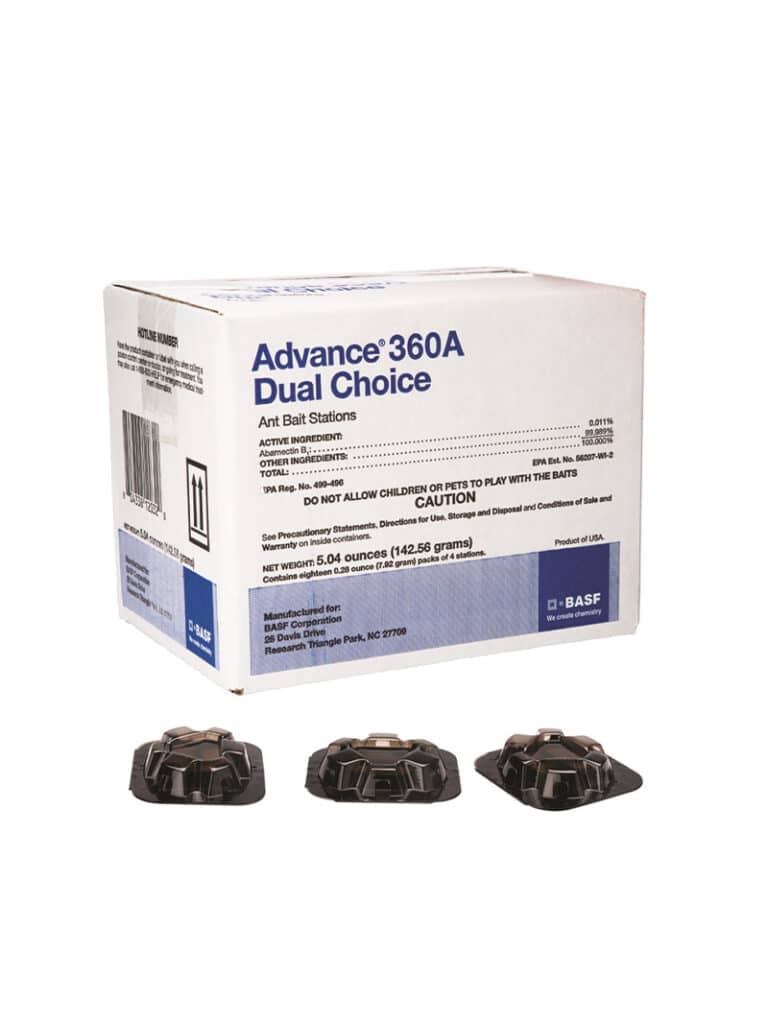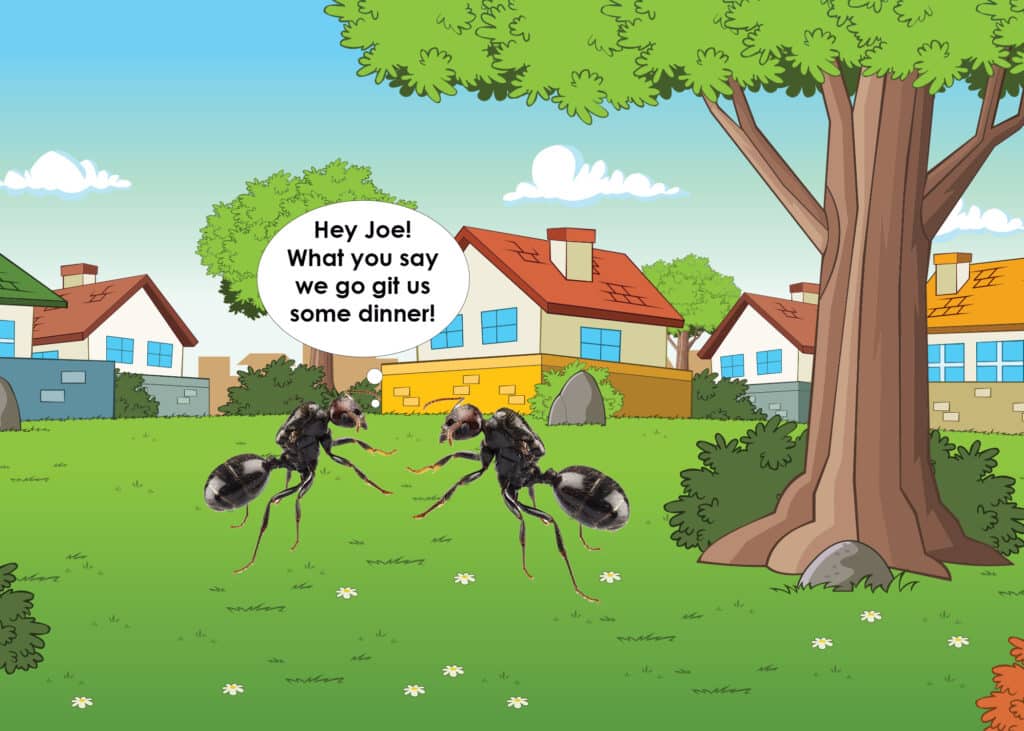
Introduction: Meet the Black Garden Ants
Have you ever seen a line of small black dots marching along your kitchen counter, your pantry, or perhaps your living room? Well, those tiny invaders are most likely black garden ants – also scientifically known as Lasius niger. These insects are common in many homes and you’re about to find out why.
Let’s start by understanding more about these tiny invaders. What are black garden ants? Why do they visit our homes?
Black Garden Ants: A Quick Overview
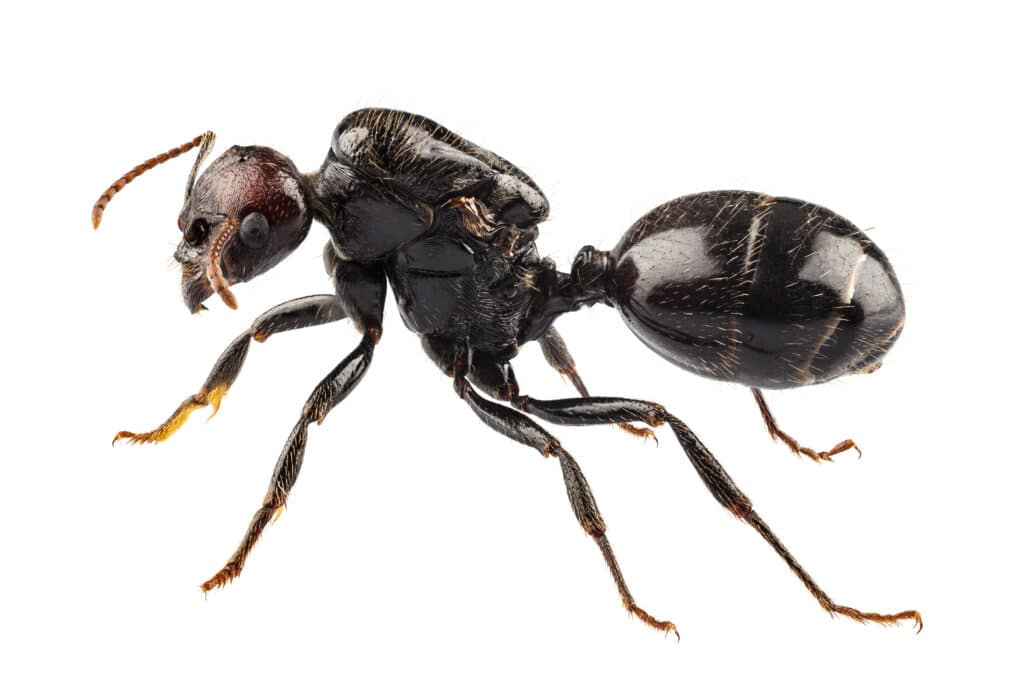
Black garden ants are among the most common type of ants found in Europe and parts of North America. They’re known for setting their colonies in backyards, hence their name.
Fun fact: A single colony of black garden ants can contain up to 15,000 worker ants, but during its peak, their colony can host up to 40,000!
What Attracts Black Garden Ants to Our Homes?
Mainly, it’s food. Your home is a ready supply of food for these ants, especially if you have sweets or other food particles lying around. Black garden ants prefer sweet substances but they will also eat other types of food if available. After spotting food, they release pheromones to signal other ants to follow their trail.
Now, to put things more in perspective let’s compare black garden ants with other common household ant types.
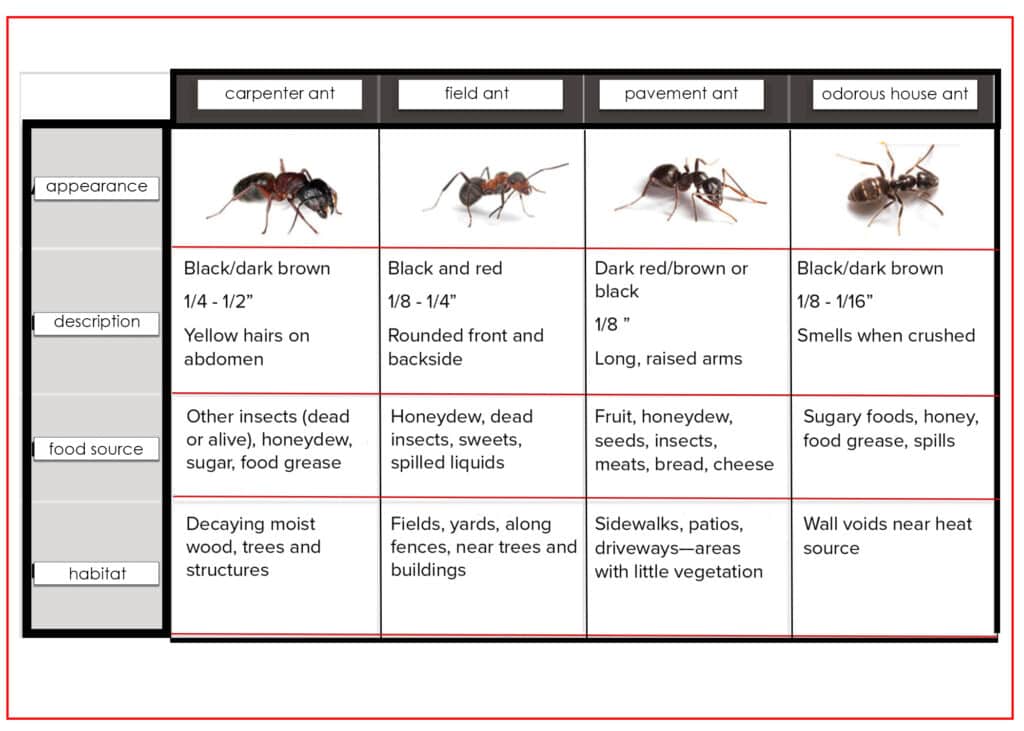
Understanding the Behavior of Black Garden Ants
Have you ever wondered why black garden ants seem to be so ubiquitous in your home? This happens because of their unique behavior and set of traits that further their survival. Let’s dig a little deeper to better understand them.
Foraging Activity
Black garden ants are primarily known for their foraging behavior. These ants are scavengers and are always on the lookout for food. They rely on their sharp sense of smell to lead them to their next meal.
“Did you know? Black garden ants can carry up to 20 times their own body weight!”
Social Structure
These ants furthermore live in highly complex and structured social colonies. Each colony comprises a queen, female workers, and males. The queen is the breeding individual, while the workers, which are infertile females, take care of various tasks such as foraging, protecting the nest, and caring for the young ants.
Survival Mechanisms
Black garden ants are renown for their advanced survival strategies. They exhibit mutualistic relationships with aphids, protecting them in return for a honeydew secretion. This, in addition to their scavenging behavior, allows them to maintain a consistent food supply.
Let’s take a look at their diet in a organized table:
The Diet of Black Garden Ants: What Do They Eat?
As homeowners, there’s a great chance you’ve had an unexpected encounter with black garden ants right inside your comfort zone. Understanding their diet might just be your first step towards getting rid of these little invaders. So, what do black garden ants eat?
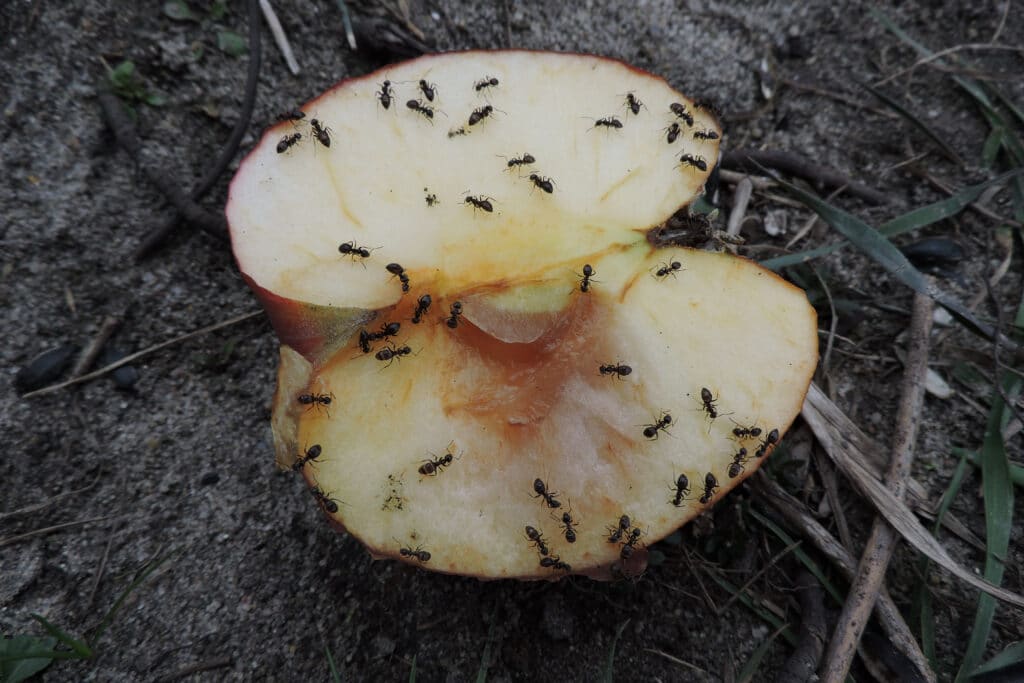
- Proteins: Black garden ants have a strong preference for protein. They feed on dead insects and small animals. An occasional insect invasion in your house might just serve as a perfect buffet for these ants.
- Sweets: They also love anything sweet. This may be the reason why you often spot them in your kitchen; leftover food, juice spills, and fallen pieces of pastries make a complete feast.
- Aphid honeydew: Interestingly, black garden ants maintain a symbiotic relationship with aphids. They farm these tiny insects for their sweet “honeydew” secretion and defend them from predators.
Special Feeding Habits
While they can make do with the food types as mentioned earlier, black garden ants are also known for their unique feeding habits. Let’s delve a bit into that.
“In their search for food, black garden ants can trail for long distances, extending even to areas far away from their nests. They place their interests in many things, ranging from domestic food scraps, pet food, and even plants. What’s more, these ants are opportunistic feeders, meaning they can adjust their diet based on available food sources, which explains their common presence in homes.”
Chemical Solutions: Effective Ways to Get Rid of Black Garden Ants
Thankfully, HowToPest.com is here to show you that there are reliable do it yourself chemical solutions available that can help you effectively manage your ant infestation. Pesticides such as ant gel baits and ant bait stations labeled for ants or black garden ants serve as one of the crucial remedies for an ant infestation.
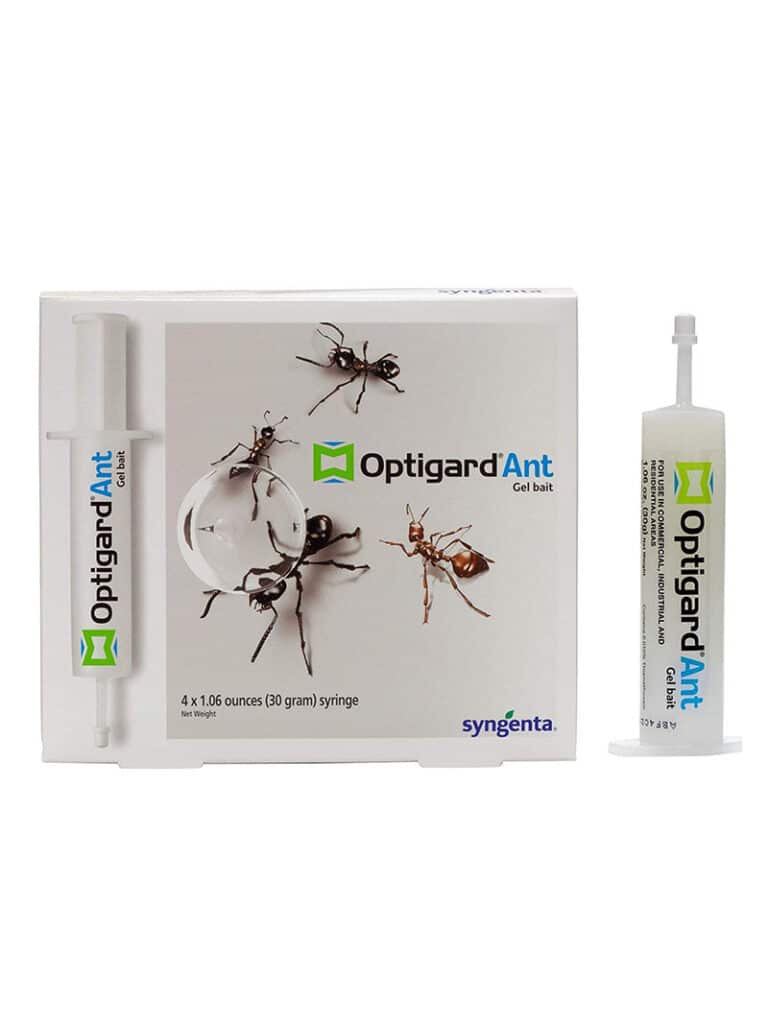
Optigard Ant Gel Bait
Ant-Proofing Your Home: Simple Steps to Keep Black Garden Ants Away
I know we have written about this a million times but we can’t stress enough how important these next steps are to keeping ants out of your house.
1. Keep Your Home Clean
Ants are primarily attracted to food and water sources. Therefore, maintaining a clean home is a critical first step in preventing an invasion. Here’s you what need to do:
- Clean up spills and crumbs immediately – Ants are particularly attracted to sweet substances, but they’ll happily feast on any food scraps they encounter.
- Store food properly – Keep food in sealed containers, especially sweet items like sugar and honey.
- Take out the garbage regularly – The smell of garbage can attract ants from a distance.
2. Seal Entry Points
Ants are tiny and can easily slip through the smallest cracks and holes. Hence, it’s important to seal any potential access points around your home.
3. Eliminate Water Sources
Like most creatures, Ants also need water to survive. If they have a reliable water source in your home, they’re unlikely to leave. To deter them:
- Fix leaky pipes – Ants are attracted to moisture.
- Wipe down sinks and bathtubs – Don’t let water accumulate in sinks and tubs because standing water attracts ants.
“Remember, ants are crafty creatures. They diligently seek out resources, so you need to be equally diligent in making your home less appealing to them.”
Common Mistakes to Avoid When Trying to Remove Black Garden Ants
Despite their small size, black garden ants can be a huge menace once they invade your home. However, it’s quite common for homeowners to make mistakes when trying to eliminate these tiny intruders. Understanding these pitfalls can improve your chances of successfully getting rid of these pests.
Avoiding Common Mistakes
Here are some common mistakes you should avoid:
- Ignoring the problem: If you spot a few ants crawling around, it’s easy to dismiss it as a minor issue. However, where there’s one ant, there’s likely an entire colony nearby. Ignoring the issue allows the colony to grow and become more challenging to eradicate.
- Using DIY methods ineffectively: There are countless DIY ant remedies out there, but if used incorrectly or without understanding the scope of the problem, they may only kill the visible ants while the colony continues to thrive.
- Not addressing the root cause: Ants enter your home for a reason – food or shelter. If you don’t take steps to remove food sources and block entry points, they will keep coming back even if you kill the current invaders.
“Not taking the right steps at the right time can turn a minor ant problem into a significant infestation. Knowledge is power, and understanding how to deal with black garden ants efficiently can save you a lot of stress and frustration.”
